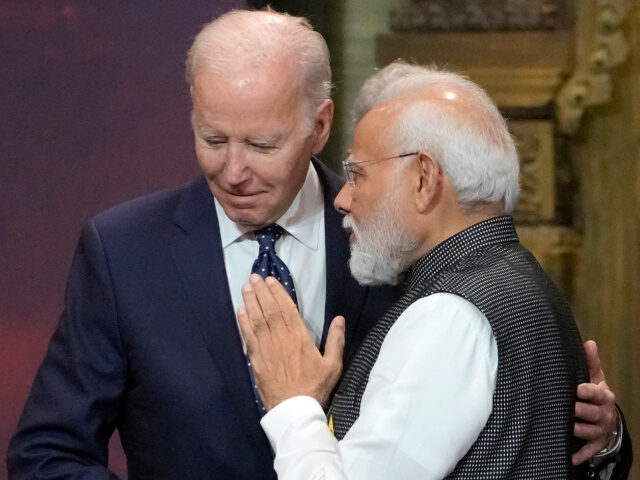Australian Prime Minister Anthony Albanese said on Wednesday that even though a planned meeting of the Quad alliance was canceled because President Joe Biden pulled out at the last minute, Prime Minister Narendra Modi of fellow Quad member India will still visit Australia next week and hold all of his scheduled events, as well as a bilateral meeting with Albanese.
Biden was scheduled to visit Australia and Papua New Guinea after attending the Group of Seven (G7) summit in Hiroshima, Japan, this weekend, but the White House canceled those visits on Tuesday, ostensibly because Biden needed to return to Washington for debt ceiling negotiations.
Biden’s bailout caused rumbles of dismay across the Indo-Pacific region and absolutely delighted China, which crowed that the fading American empire no longer values its allies and lacks the political and economic strength to meet its obligations to them.
The Quadrilateral Security Dialogue, or “Quad,” counts the United States, Japan, Australia, and India as members. The alliance is despised by Communist China, which views it as a Cold War-style reactionary effort to contain China’s rising power in the region.
“Prime Minister Modi will be here next week for a bilateral meeting with myself,” Albanese told Australia’s ABC Radio when asked if Modi would cancel his trip to Australia because of Biden’s no-show, as Japanese Prime Minister Kishida Fumio did.
“Prime Minister Kishida was just coming for the Quad meeting. There wasn’t a separate bilateral program,” Albanese noted. He anticipated meeting with the other Quad leaders on the sidelines of the G7 meeting, which all of them will attend.
“You can’t have a Quad leaders meeting when there are only three out of the four there,” Albanese said, adding that he was disappointed Biden scuttled the meeting.
India’s WION News pointed out that Albanese sounded much less certain that Modi was coming earlier in the day when he made public statements about the warm welcome Australia would extend if he visited as originally planned.
ABC News reported that Indian groups in Australia went to great lengths to prepare for Modi’s visit, including a sold-out three-hour reception party at Sydney Olympic Park, a venue that can accommodate more than 20,000 spectators.
The Indian Australian Diaspora Foundation chartered a plane dubbed “Modi Airways” to ferry Modi supporters from Melbourne to Sydney for the reception, while Indian Australians residing in Brisbane settled for a charter bus, which they call the “Modi Express.”
Pranav Aggarwal, a spokesman for the Indian Australian Diaspora Foundation, said there were some jittery “nerves” around his office after Kishida canceled, but then, a swell of relief when Modi confirmed he was still coming.
“It is a rare moment. The excitement really knows no bounds. There have been over 20,000 tickets which have been given out, and really our colleagues have been buzzing,” Aggarwal said.
Someone who did not share that enthusiasm defaced a Hindu temple in Sydney in May, painting the words “Declare Modi Terrorist” on its walls. A Sikh separatist group called the Khalistan Movement is considered a likely suspect, but the Australian Sikh Association quickly condemned the vandalism.
According to India’s Ministry of External Affairs, Modi will visit Australia from May 22 to 24 following the G7 summit in Japan. He will then travel to Papua New Guinea to cohost the Forum for India-Pacific Islands Cooperation, a meeting Biden was supposed to attend.
Bloomberg News noted that Modi’s visit “comes as Australia is attempting to strengthen its diplomatic and economic ties with India to offset growing strategic competition between the U.S. and China,” the latter being Australia’s largest trading partner.
“Australia is currently negotiating the second stage of a free trade agreement with India, while a growing diaspora is helping bolster the country’s valuable tertiary education sector,” Bloomberg added.
On Thursday, Voice of America News (VOA) quoted analysts who said Biden’s cancellation harmed the Quad’s “ambitions to be an influential alternative to China” and damaged “the reputation of the United States as a reliable ally at a time when strategic competition with China in the Indo-Pacific region is intensifying.”
Biden might even have created an opening for Beijing to peel Australia away from the Western alliance. VOA noted that on Thursday, the Chinese ambassador to Australia announced that China will resume importing Australian timber, a billion-dollar trade that was banned two years ago when the previous Australian administration insisted on investigating the origins of the Wuhan coronavirus.
Albanese’s left-wing Labor government is much more amenable to Beijing’s interests than his predecessor, Scott Morrison, especially when it comes to accepting the Chinese Communist Party’s account of the coronavirus pandemic. The timber ban is among several punishments China inflicted on Australia that have been lifted as relations thaw, with wine and barley possibly coming next.
The American leadership vacuum could also provide opportunities for India and Japan to raise their profiles as regional powers. Modi’s government is pushing hard to position India as the leader of the “Global South,” an enthusiastically deployed but somewhat vaguely defined buzzword for developing nations that feel underappreciated by organizations such as the G7. Japan is loosening up its rules for military deployment, taking more of a leadership role in regional defense against China and its feral client state, North Korea, and organizing infrastructure projects to compete with China’s Belt and Road Initiative (BRI).

COMMENTS
Please let us know if you're having issues with commenting.